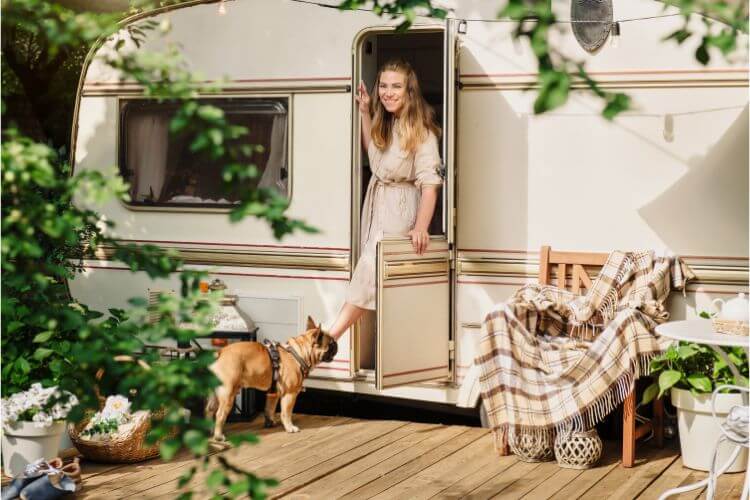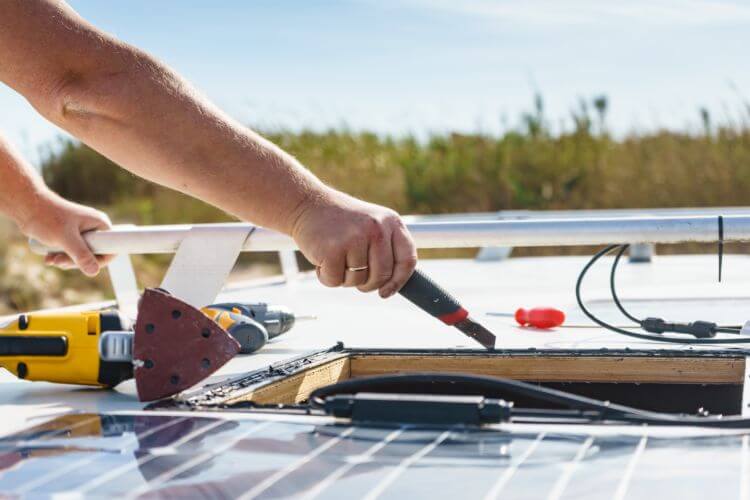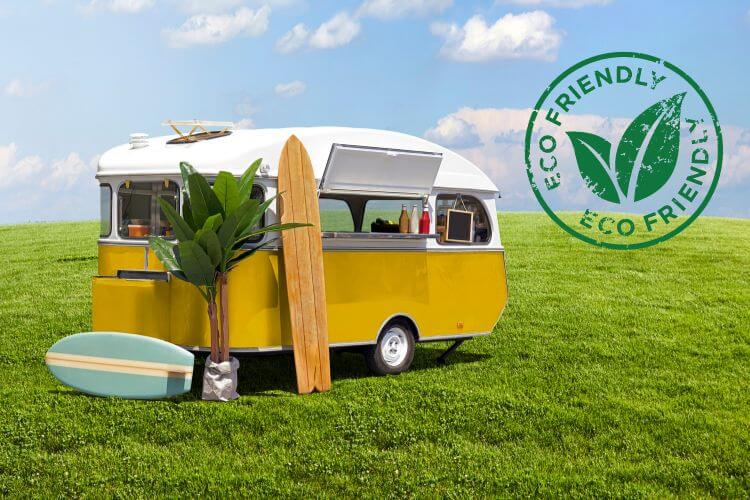Living off the grid in a caravan can be a great way to lead a more sustainable lifestyle. By reducing reliance on traditional utilities and embracing eco-friendly practices, you can reduce your carbon footprint and live a more self-sufficient life.
There are many ways to live eco-friendly in a caravan, from choosing sustainable materials for your caravan to adopting green habits in your daily routine. One of the most important steps is to invest in a caravan that is manufactured using environmentally responsible and sustainable best practices.
Look for caravans that are made from recycled materials and have energy-efficient features such as solar panels and LED lighting.
Once you have a sustainable caravan, there are many things you can do to reduce your environmental impact. For example, you can use reusable wax paper to wrap food, store foods in stainless steel containers, and invest in a metal flask for your drinking water. By adopting these habits, you can live a more eco-friendly lifestyle and reduce your impact on the planet.
Choosing an Eco-Friendly Caravan

When it comes to choosing an eco-friendly caravan, there are a few things to consider. First and foremost, you want to look for caravans that are made with environmentally responsible best practices. This means that they use materials that are more sustainable and have a lower impact on the environment.
You should also consider the size of the caravan. A smaller caravan will have a lower impact on the environment than a larger one. Additionally, look for caravans that are designed to be energy-efficient. This can include features such as solar panels, LED lighting, and efficient appliances.
Another factor to consider when choosing an eco-friendly caravan is the type of fuel it uses. Diesel and petrol engines are not as eco-friendly as electric or hybrid engines. If you’re looking for a truly eco-friendly option, consider an electric or hybrid caravan.
Finally, look for caravans that are designed to be durable and long-lasting. A caravan that is built to last will require fewer resources to replace over time, making it a more sustainable option.
Energy-Efficient Appliances
One of the simplest ways to live an eco-friendly life in a caravan is to use energy-efficient appliances. These appliances can help you reduce your energy consumption and save money on your utility bills. Here are some tips for choosing energy-efficient appliances:
- Choose appliances with high energy-efficiency ratings
- Use LED light bulbs instead of incandescent bulbs
- Consider low-energy refrigerators and other appliances
- Use a solar-powered generator or battery system to power your appliances
When choosing appliances, look for the ENERGY STAR label. This label indicates that the appliance meets strict energy efficiency guidelines set by the U.S. Environmental Protection Agency. ENERGY STAR appliances use up to 50% less energy than standard appliances, which can help you save money on your utility bills and reduce your carbon footprint.
Another way to reduce your energy consumption is to use a solar-powered generator or battery system to power your appliances.
These systems can be installed on your caravan roof and can provide power for your appliances, lights, and other devices without the need for a traditional generator or mains power. This can help you reduce your reliance on fossil fuels and reduce your carbon footprint.
Water Conservation
Water conservation is an essential aspect of an eco-friendly lifestyle, especially when living in a caravan. Here are some tips to help you conserve water:
- Install low-flow showerheads and faucets to reduce water usage.
- Fix any leaks as soon as possible. A small drip can waste a lot of water over time.
- Use a bucket or basin to catch and reuse greywater from washing dishes or clothes. This water can be used to flush the toilet or water plants.
- Take shorter showers or consider using a water-saving shower timer.
- Use a broom to clean outdoor areas instead of a hose.
- When washing dishes, fill up the sink with soapy water and rinse them all at once instead of letting the water run continuously.
- Consider installing a composting toilet which uses little to no water.
By adopting these water conservation practices, you can reduce your water usage and contribute to a more sustainable lifestyle.
Waste Management
Living off the grid in a caravan can be a great way to reduce your carbon footprint, but it’s important to manage your waste properly to minimize your impact on the environment. Here are a few tips to help you manage your waste:
- Separate your waste: Make sure to separate your waste into recyclable and non-recyclable items. This will help reduce the amount of waste that ends up in landfills.
- Compost: Consider setting up your own compost bin to dispose of food waste. This can help reduce your environmental impact and provide you with nutrient-rich soil for gardening.
- Reduce packaging waste: When shopping for groceries, try to choose items with minimal packaging to reduce waste. You can also bring your own reusable bags and containers to avoid using single-use plastics.
- Dispose of hazardous waste properly: If you have hazardous waste such as batteries or electronics, make sure to dispose of them properly. Many recycling centers accept hazardous waste for safe disposal.
By following these waste management tips, you can reduce your environmental impact and live more sustainably while living off the grid in your caravan.
Sustainable Living Practices

Living off the grid in a caravan requires a sustainable approach to life. Here are some eco-friendly practices to help you reduce your carbon footprint:
- Solar power: Install solar panels on your caravan roof to generate electricity. This will help you reduce your reliance on non-renewable energy sources and save money on electricity bills.
- Water conservation: Install a water filtration system to recycle greywater for non-potable uses such as flushing the toilet or watering plants. Use low-flow showerheads and faucets to reduce water consumption.
- Composting: Use a composting toilet to turn human waste into compost. This will help you reduce water usage and eliminate the need for a septic tank.
- Waste reduction: Reduce waste by using reusable containers, bags, and utensils. Recycle as much as possible and dispose of hazardous waste properly.
- Food production: Grow your own food using organic and sustainable farming practices. This will help you reduce your carbon footprint and ensure that you have access to fresh, healthy food.
By adopting these sustainable living practices, you can live off the grid in a caravan while reducing your impact on the environment. Remember to always be mindful of your actions and strive to make eco-friendly choices whenever possible.
Conclusion
Living eco-friendly in a caravan is a great way to reduce your carbon footprint and contribute to a more sustainable future. It is important to remember that every small action counts, and by making conscious choices, we can all make a positive impact on the environment.
There are many ways to live sustainably in a caravan, including using renewable energy sources, reducing water usage, and minimizing waste. By choosing an eco-friendly caravan and making conscious choices about the products we use, we can reduce our impact on the environment.
It is also important to be mindful of our impact on the communities we visit. When travelling in a caravan, we should be respectful of the local environment and culture, and support local businesses wherever possible.
Ultimately, living eco-friendly in a caravan is not only good for the environment but can also lead to a simpler, more fulfilling way of life. By embracing a more sustainable lifestyle, we can all contribute to a better future for ourselves and future generations.



